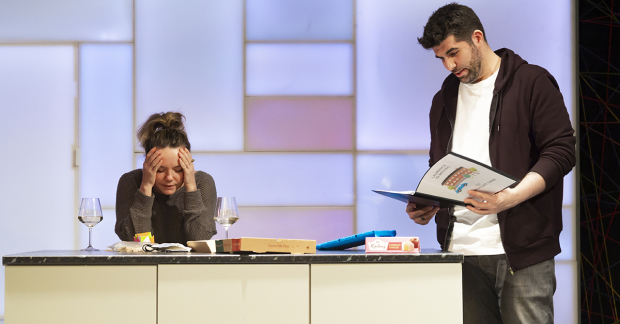Review: All In a Row (Southwark Playhouse)
Alex Oates uses his experience working with learning disabled adults and children for the basis of his new play

© Nick Rutter
With more than 10 years of experience working with learning disabled adults and children to inform his work, playwright Alex Oates can surely never have expected the storm of criticism that has accompanied his new play, All In A Row, at Southwark Playhouse.
It's a sad and thoughtful examination of parents Tamora and Martin, who are teetering on the brink of family breakdown, as they come to terms with the fact that their 11 year old son Laurence, who is autistic, has a profound learning disability and behavioural problems including violence, will soon be leaving their home to be cared for in a residential facility 200 miles away. Worse still, this follows an intervention by social services and the police.
Yet a play that should, on the face of it, be seen as an honest and worthwhile attempt to shed light on the long-term difficulties faced by families who struggle to cope, has been swept away under a tidal wave of bitter Twitter exchanges. A petition has claimed thousands of signatures, with protesters outside the theatre accusing the production of dehumanising autistic people.
At the heart of this controversy is a puppet, conceived by Oates, created by Sian Kidd with evident care and commitment, and operated by puppeteer Hugh Purves. It represents Laurence who thus, according to the protesters, is portrayed as less than human.
Oates explains the decision as wanting to create a portrayal of Laurence that ‘does justice to his incredibly unique personality while still keeping a respectful distance.'
However, the protesters do have a point here, as sadly the grey-faced puppet adds nothing to the production that a living actor – adult or child – could not have provided. On one level the solution seems simple enough – ditch the puppet, and allow the expressive and engaging Purves to act the role he's already playing, without the puppet attached to his front.
He's working alongside a committed cast. Charlie Brooks gives a heartbreaking performance as a mother whose sense of guilt and failure are mixed with an illicit touch of excitement at the prospect of losing day-to-day care of her child.
Simon Lipkin as adoring but wrung-out Martin has a powerful presence, capturing a loving father's anger and frustration, though his character is also landed with some awful, sexist jokes that run the risk of alienating another swathe of the audience.
Devoted carer Gary is played with self-effacing charm by Michael Fox, and his delicately nuanced performance is a grounding force amid the surrounding surges of emotion. However his character is given some particularly disparaging lines about people with severe learning disabilites, like Laurence, and it's hard to believe any professional carer could dream of making such remarks to a parent.
Designer PJ McEvoy has created a set that combines domesticity with walls made up of woolen webs like a giant cat's cradle – or a net – that surrounds the family, and Rachel Sampley's crisp lighting design brings clarity to the changes of mood.
Dominic Shaw's production has seen both the theatre and company members having to publicly justify their artistic choices. There is no doubt that this play has the very best of intentions but its strengths have been clouded, largely by a puppet that could quite easily be left in the dressing room.


















